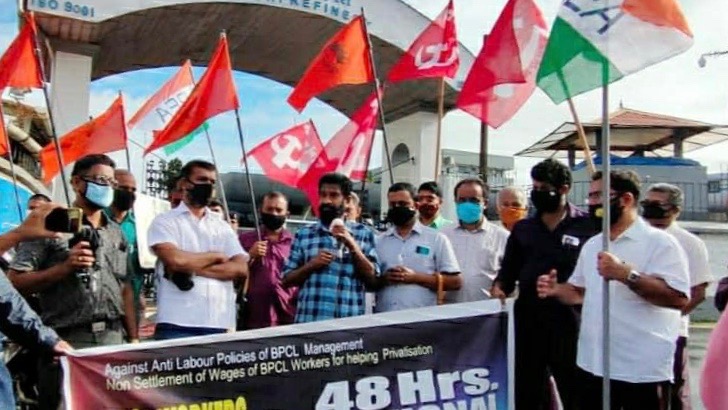Thousands of refinery workers across India took part in a 48-hour strike on September 7-8 to protest against a wage settlement decision by the management of state-owned Bharat Petroleum Corporation Limited (BPCL). The workers said the wage settlement abets the early privatization of the company, which has around 5,500 employees.
Wage revisions at BPCL have been pending since January 2017. However, workers are demanding a wage settlement as per the guidelines of the Department of Public Enterprises, which has already been granted to the management officials.
Nearly 60% of the non-management staff of the BPCL Kochi refinery participated in the strike. As per secretary of the Cochin Refinery Workers’ Association, Aji M G, “A total of 4,570 workers, led by 13 unions in BPCL Mumbai, Kochi Refinery and marketing sectors of BPCL are taking part in the strike”.
“For a long time, the employees of Bharat Petroleum Corporation Limited have been demanding that they should be given benefits at par with other public sector oil companies,” Nogen Chutia, general secretary of the Petroleum and Gas Workers’ Federation of India, told NewsClick.
BPCL, the second largest fuel retailer and the third largest refinery operator in the country, is likely to be privatized by next year. The government intends to sell its entire 52.98% stake at BPCL before March 2021. In this context, refinery workers are opposing the decision to allow the company’s management to review the terms of the 10-year service contracts of the workers. “A private management would then be free to amend the terms of service of the workers,” claimed Aji.
“If the right to amend the terms of the contract in June 2022 is given to the management, they will have the power to make any amendments in the terms of service of the workers,” he added. As per the management, workers will receive full retirement benefits and gratuity only if BPCL remains in the public sector. However, the same is not true for the management staff.
“The workers are also not happy with the Bharat Petroleum Corporation Limited management’s bid to split the unions,” according to Aji. The BPCL management began signing a memorandum of understanding (MoU) with two of the 18 unions at BPCL. Although these two unions represent only 12% of the BPCL workforce, the management has refused to negotiate with the rest of the unions until they also sign the MoU.
Workers are also miffed with the government’s decision to provide guidance on employee protection, asset stripping and business continuity in the company to the potential acquirers of BPCL only at a later stage of bidding.
(With inputs from NewsClick)





